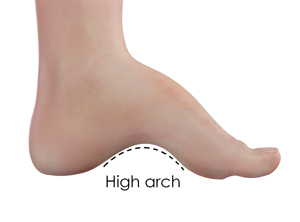Cavus Foot Specialist in texas
Cavus foot is a condition in which the arch on the bottom of the foot is curved more than normal leading to pain and instability in the foot while walking, standing and running. Children with neurological disorders or other conditions are more likely to develop Cavus foot. Dr. Downey provides expert diagnosis and individualized non-operative and operative treatments for Cavus foot deformity in texas. Contact Dr. Downey’s team for an appointment today!

What is Cavus Foot Deformity?
Cavus foot also referred to as a high arch, is a condition in which the arch on the bottom of the foot that runs from the toes to the heel is arched more than normal. Because of this, excessive weight falls on the ball and heel of the foot when walking or standing, causing pain and instability. Children with neurological disorders or other conditions such as cerebral palsy, spina bifida, poliomyelitis, and muscular dystrophy are more likely to develop Cavus foot. It may sometimes occur as an inherited abnormality.
Symptoms of Cavus Foot Deformity
The symptoms of Cavus foot deformity include one or more of the following:
- Pain in the foot while walking, standing and running
- The heel is tilted inwards leading to instability of the foot and ankle sprains
- Calluses can form on the ball and outer edges of the foot
- Toe may bend to form a hammertoe or claw toe
- Difficulty in wearing shoes
- Shortened foot length
Diagnosis of Cavus Foot Deformity
Diagnosis of Cavus foot is based on your family history and a physical examination of the foot. X-rays of your feet may also be ordered to diagnose the condition.
Treatment for Cavus Foot Deformity
High arches that are flexible do not require any treatment. In case of pain, shoe modifications such as an arch insert or support insole can help to relieve pain during walking. Custom orthotic devices can be prescribed to fit into the shoe to provide stability and cushioning. Your doctor may recommend a brace to help keep the foot and ankle stable. In severe cases, surgery is performed to flatten the foot. Any coexisting nerve disorders are also treated.
If you would like to have additional information on the treatment of Cavus foot deformity, please contact Dr. Downey, serving the communities of texas.
Related Topics:
- Congenital Deformity & Clubfoot
- Charcot Foot Deformity
- Cavus Foot Deformity
- Achilles Tendon Rupture
- Ankle Sprain
- Ankle Instability
- Turf Toe
- Shin Splints
- Foot & Ankle Trauma
- Ankle Fractures
- Foot Fracture
- Talus Fractures
- Calcaneal Fracture
- Lisfranc (Midfoot) Injury
- Foot & Ankle Arthritis
- Ankle Rheumatoid Arthritis
- Foot Rheumatoid Arthritis
- Midfoot Arthritis
- Plantar Fasciitis
- Foot Pain
- Heel Pain
- Bunion
- Bunionette
- Hallux Rigiditis
- Heel Spurs
- Ganglion & Soft Tissue Tumors
- Foot Problems
- Heel Fractures
- Forefoot Pain
- Achilles Tendon Bursitis
- Morton's Neuroma
- Ankle Ligament Injury
- Flatfoot
- Ankle Dislocation
- Burning Neuropathic Pain
- Freiberg's Disease
- Lesser Toe Deformities
- Haglunds Deformity
- Peroneal Tendon Dislocation
- Foot Cancer
- Osteochondral Injuries of the Ankle
- Hallux Limitus
- Lisfranc (Midfoot) Fracture
- Intoeing
- Plantar Fibromas
- Sesamoiditis
- Foot Drop
- Hammertoe
- Nerve Conditions of the Foot
- Foot Spasms
- Kohler Disease
- Claw Toe
- Congenital Limb Deformities
- Ingrown toenail
- Foot Lesions
- Sever's Disease
- Fifth Metatarsal Fractures
- Mallet Toe
- Metatarsal & Phalangeal (Forefoot) Fractures
- Sesamoid Fracture
- Diabetic Foot Conditions
- Posterior Tibial Tendon Dysfunction
- Foot Inflammation
- Stress Fractures of Foot & Ankle
- Bunionette (Tailor's Bunion)
- Achilles Tendinitis
- Metatarsalgia
- Osteochondral Lesions of the Ankle
- Adult Leg Length Discrepancy
- Pediatric Foot Conditions
- Overlapping or Underlapping Toe
- Stiff Big Toe (Hallux Rigidus)
- Tarsal Tunnel Syndrome
- Vertical Talus

